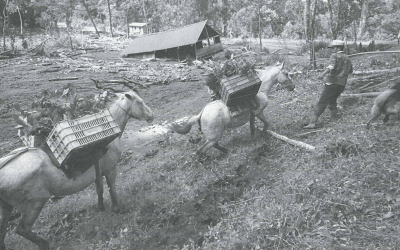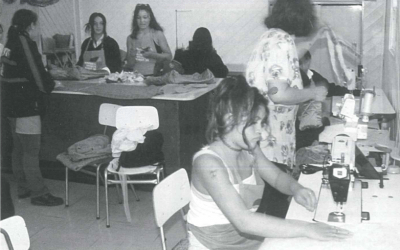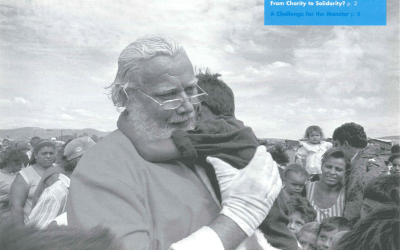Transparencia
When citizens throughout the world cast their votes–be it in a presidential, congressional or municipal election–they are exercising a fundamental right and responsibility: to participate in selecting the leadership that they believe will best represent their interests. However, the rights and responsibilities of voters do not end at the polls. Working side by side with international observer delegations, groups of citizens throughout the world are increasingly exercising their right to pressure governments and assure that the elections they participate in are transparent, free, and fair.
In the Latin American region alone, citizens have formed electoral monitoring organizations in 12 countries. Chile’s Participa was the first in 1988 followed by Paraguay’s Saka in 1990. Alianza Civica in Mexico, a coalition of civil society organizations, has been observing elections since 1994. These organizations are mostly staffed by volunteers private citizens from all walks of life who are committed to promoting and defending democracy in their countries.
Volunteer citizens observe Peru’s controversial 2000 elections
This article focuses on one of these organizations, Peru’s Asociación Civil Transparencia, founded in 1994 by a group of Peruvian intellectuals and religious figures, who believed that citizens needed to play a more active role in assuring transparency in Peru’s elections and in promoting a better understanding of democratic processes. Transparencia has now mobilized more than 70,000 people, mostly volunteers, to observe in all types of elections, including three presidential and parliamentary elections (1995, 2000, 2001). Between elections, Transparencia has tapped on its broad volunteer base to assist communities and civic associations to organize and observe their own elections, train high school students to carry out democratic school elections, promote citizen vigilance of elected officials and prepare a high school civic education textbook widely used throughout the country.
Peru’s 2000 presidential and parliamentary elections–among the most irregular and fraudulent in Latin American history–provided Transparencia with what was one of the strongest challenges faced to date by any domestic election observation entity. By early 1999, Transparencia’s board of directors knew that they would be entering a highly charged electoral environment. Alberto Fujimori, then completing his second consecutive term as president, was determined at all costs to be elected for a third (and illegal) term. In fact, Transparencia and other civil society organizations had evidence that Fujimori had been preparing the way for this since 1992 when he engineered a self-coup leading to legislation increasing direct executive control.
With this in mind, Transparencia’s board decided to adopt a bold and comprehensive observation strategy that included numerous risks for the organization and its volunteer base.
Their agenda included: (1) taking on a wider range of observation functions before and after the elections, as well as traditional election day monitoring, (2) nurturing and expanding existing coalitions with other civil society organizations, and (3) establishing a close relationship with international observers and foreign governments also concerned with the credibility of Peru’s 2000 electoral process. Transparencia’s board also realized they had to draw on the good will of thousands of Peruvians, most of whom would be serving as volunteers, to reach these ambitious goals.
In spite of sometimes high levels of tension during the 2000 election, the core Transparencia staff and their thousands of volunteers throughout the country provided the Peruvian public and the international community with invaluable information on various aspects of the electoral process: the candidates, the electoral registry, scrutiny of the votes, and the outcome of the voting process. Transparencia’s quick count on April 9, carried out almost entirely by volunteer pollwatchers, had more legitimacy than the official vote tabulation and became the standard that influential Peruvians and the international community used to keep Fujimori from being elected in the first round.
However, Transparencia and international observers, unable to stem the escalating irregularities between the first and second electoral rounds, decided to withdraw from observing the second May 28 electoral round. Although Fujimori was elected for his third term in this widely questioned second round, by November, the new Fujimori government had collapsed, sparked by electoral corruption and fraud scandals that came to light after the elections themselves. A transition government subsequently called new presidential and parliamentary elections in April 2001, and Transparencia again assumed a fundamental role as impartial elections observer. Unlike in the 2000 elections, Transparencia and its thousands of volunteers were able this time to document an electoral process that was free, fair and transparent.
Today, Transparencia is gearing up to use its large reservoir of knowledge and human energy to promote electoral reform legislation, and to mobilize citizens throughout the country to take part in active vigilance of elected officials.
How can volunteers support democracy through observing elections?
Nearly 20,000 volunteers collaborated directly with Transparencia in observing the 2000 elections. Several thousand more formed the cadre of some 400 Peruvian civil society organizations joining with Transparencia to assist in the observation process. Opportunities for collaboration ranged from providing input for Transparencia’s statements on the legality of government actions involving the electoral process, to assisting with a myriad of activities at Transparencia’s Lima headquarters, to preparing for and observing on the day of the elections. Collaborators, mostly on a volunteer basis, ranged from among Peru’s most highly respected lawyers, political analysts, and media experts (who were actively involved in Transparencia’s extensive pre-electoral observation) to high school students, university students, schoolteachers, accountants, small business owners, and housewives (who played a particularly critical role observing on elections day). Of the nearly 20,000 volunteers who served as poll watchers on elections day, 57% were men and 43% women. Volunteers ranged in age from 18 to over 60, with the highest concentration (60%) between 18 and 30. In terms of occupations: 43% were high school and university students; 17% were teachers; 7% were employed in the wage and salary sector; 6% were self-employed professionals; 6% were self-employed blue collar workers; 5% worked in agriculture; and 4% in commerce.
What is in it for the volunteers?
One might ask: how have Transparencia and other elections observation organizations been able to draw so many eager volunteers to observe in electoral processes? Why did these individuals take from their free time to collaborate in what was, at times, a very high pressure and even dangerous environment?
I set out to find the answers through follow-up interviews with more than 60 individuals, ranging from the president of Transparencia’s Board of Directors to volunteers in the field. Although the sampling is relatively small, the data collected provide useful insights into why individuals in Peru and in other countries take time out from other activities, often at a significant personal expense, to participate as volunteers in an electoral observation process.
1. A valuable learning opportunity
Many of the volunteers found that participating in the elections observation process provided them with a valuable opportunity to learn: about democracy in general, about the electoral process, about people from different backgrounds. Wendy Agustin (21 years old, a third year sociology student at a university in Lima and a volunteer trainer for Transparencia) comments,
“The fact that I was able to visit and become acquainted with so many areas of my country. My trip to Pataz, in particular, had an impact on me because I had never been to such a poor community. For people who live in Pataz it is hard to leave their community. They have one fax, three telephones that function until 6 P.M., there is no national radio station, just channels 2 and 4 on television (both of which were controlled by the State during the 2000 elections). The only people with higher education are the school teachers. It takes 17 hours to travel from Pataz to Lima. I returned to Lima sick, alarmed with what takes place in my country. As a social worker I wouldn’t have had an opportunity to be exposed to these types of realities. Transparencia has given me this opportunity.”
2. An opportunity to educate others.
Participating in the electoral observation process provides an equally important opportunity to educate others–colleagues, friends, and family members. In the words of Sujey Piscoya–a university student in communications who worked full-time as a volunteer at Transparencia headquarters during the 2000 elections:
“My collaboration with Transparencia has permitted me to educate other members of my family, my friends in my neighborhood, my colleagues at the university. My friends were never concerned about politics and how important their vote is. Now, when I meet with them, they ask me questions. I feel good.”
3. An opportunity to contribute to a cause one believes in Electoral observers were afforded an opportunity to feel useful: the sense that through collaborating with an organization such as Transparencia one is supporting democracy, contributing to a cause one believes in. Carmen Rosa Arevalo, a preschool teacher who was elections 2000 alternate coordinator for Transparencia’s provincial committee of Maynas in the northern jungles of Peru observes,
“The challenge of participating in Transparencia is that you are strengthening democracy especially given that in this region we are living very difficult moments given the political context. We commit ourselves when we see and dialogue with people who gave us their testimonies. The population, once activated, takes on its own conscience. People say “Caramba, where is Transparencia? Everyone has spoken of Transparencia.””
4. A channel for independent political participation.
In 2000, Transparencia was one of the few games in town for those who do not trust or identify with the political parties. Francisco Eguiguren, a member of Transparencia’s General Assembly and currently the head of Catholic University Law School says,
“Transparencia has given me the sense that I can do something to contribute to the political process and to democracy in my country without being a politician. Uniting forces with others who, without ambition for achieving a political position, can collaborate to achieve democracy in our country.”
5. An opportunity for personal growth and recognition.
Yrene del Pozo, a volunteer in Puno since 1996, found collaborating with Transparencia a valuable opportunity for personal growth and recognition.
“Within my work environment Transparencia has elevated my self-esteem. Every time there is an election the members of my union solicit my assistance as president and member of the electoral committee since they consider that my participation guarantees that it will be a clean process. For this reason I have to continue serving as a model that guarantees neutrality in my work environment.”
Learning from the volunteer experience
Among the many lessons learned from the experience of Transparencia that apply to elections observation in other countries are: even when international observers are necessary, you need good volunteers and vigilant citizens on the ground to make that observation work; elections observation provides an important channel for concerned citizens to participate in strengthening democracy; volunteers can play a very important, and effective observation role, regardless of the electoral environment; Transparencia and other elections observation organizations are only as good and as credible as their volunteer base.
Volunteer-based elections observation entities also pose challenges such as the quick organizational and logistical capacity required to effectively mobilize thousands of volunteers throughout the country on elections day. The organization must also be careful not to raise unrealistic expectations among volunteers for continued involvement in promoting post-electoral democracy.
Living democracy is much more valuable than saying the word
The Transparencia experience highlights the fact that giving and volunteering in Latin America is not only focused on addressing poverty and basic social needs (fundamental though they are), but is also fundamental to any effort to defend and consolidate democracy. Transparencia’s experience observing Peru’s 2000 elections is one of many over the past decade in Latin America in which civil society organizations have drawn together thousands of volunteers from all walks of life to contribute to democracy by serving as neutral and non-partisan observers of their countries’ electoral processes.
To summarize: citizens operating in a volunteer capacity can, through their participation in observing an electoral process, play an important role in assuring that the conditions are in place for a key democratic process like an election and, if these conditions are not in place, to help bring these conditions to public light. Volunteer citizens can play multiple roles in observing an electoral process; it can also be a personal education for them, an opportunity to “live” democracy.
Maria del Pilar Ramirez Mora, a 16 year old high school junior who volunteered her time to provide electoral information to voters, reflected on her hopes for future involvement with Transparencia:
“I would love to continue participating with Transparencia all the years that I can. When I have children I hope there is an institution like Transparencia so that they can have the same opportunity that I have had to have a more real experience. Living democracy is much more valuable than saying the word.”
Spring 2002, Volume I, Number 3
Marcia Bernbaum has been working in development in Latin America for more than 20 years. She has authored several evaluations and case studies focusing on the role of civil society in promoting democracy. The case studies, upon which this article is based, along with additional information on Transparencia, are available at . Bernbaum may be contacted at . The author wished to thank Transparencia and Pat Merloe (NDI) for their input on this article.
Related Articles
Obras de Infraestructura Básica de Fácil Ejecución a través de la Autogestión
En el Ecuador rural y en las zonas citadinas marginales, la carencia de servicios básicos se ha convertido en un mal endémico no resuelto hasta …
Responsabilidad Social Empresarial: Algunos Hechos Que Cuentan
La Responsabilidad Social Corporativa (RSC) es una temática más bien nueva en Chile. Aún cuando se encuentran acciones filantrópicas desde tiempos de la colonia, la relación de la …
Algunos Casos en Chile
Un caso fue José Tomás Urmeneta, un empresario del siglo XIX quien, en un momento de auge del sector agroexportador chileno, en su testamento dejó asignados recursos para …




